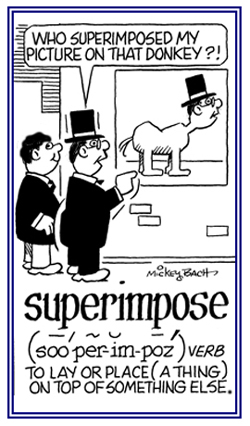pon-, posit-, pos-, -poning, -poned, -ponency, -ponent, -ponement, -pound
(Latin: to place, to put, to set; placement, positioning)
2. The senior administrator at a cathedral or a church: In a revolutionary move, a woman was elected to be the next provost for the cathedral.
3. The administrative head of a prison: Mr. Gregory, the long serving provost at the local prison, decided to retire.
4. Etymology: from Old English profost, from Medieval Latin propositus, from Latin propositus, praepositus, "a chief, a prefect"; literally, "placed before, in charge of"; from the past participle of præponere, "to put before".
2. Individual determination or resolve to achieve a goal: Leah's purpose in practicing the piano for six hours every day was that she wanted to be a concert pianist.
2. Freedom from worry, troubles, and stress, and so having a peace of mind: The workers of the company, including Jack and Stuart, continued to have a repose about their jobs even with all of the bad news being presented about the national economy.
3. Having a calmness and composure of manner: Rufus appeared to be in repose despite having to wait so long for the delayed flight.
4. The absence of motion or activity; stillness: Sally could see her husband's body in repose as he took his afternoon nap.
2. To place trust, hope, or confidence in something or someone: Carol has always reposed her trust in her father's judgment and she was still reposing her confidence that his advice was reliable.
2. To place or to put in a new arrangement: The family was busy repositioning the furniture in their living room.
3. To update or to change the marketing of a product or service: The manager, Mr. Swift, was striving to reposition the image of the company's products in an effort to increase their sales.
4. Etymology: from Late Latin repositionem the nominative case of repositio; from Latin repositus, the past participle form of reponere, "to put back, to put away"; from re-, "back, away" + ponere, "to put, to place".
A vault or safe is considered to be the most secure repository for valuable possessions; such as, jewelry or money.
Some books are great repositories of knowledge and even wisdom.
2. A location where a natural resource is available: There are some countries that have repositories of salt which are being processed for human use.There are simply too many areas in the world that desperately need sufficient repositories of water for their people, animals, and all kinds of plants.
Here are a few examples of repositories: warehouses, vaults, storerooms, banks, reservoirs, libraries, museums, web sites, natural resources, etc.
3. Etymology: from Latin reposit-, "a stand on which food is stored"; from reponere, "to put away, to store"; from re-, "back, away" + ponere, "to put, to place."

Go to this Word A Day Revisited Index
so you can see more of Mickey Bach's cartoons.
2. To change or to reconstruct something so it can function or work in a different way: The company is trying to repurpose old computer equipment into other practical electronic applications.
Mr. Lange, the geography teacher, superimposed a transparent sheet showing the national boundaries over an outline of the continent of Europe.
2. To add as a different type, element, or quality: Marion, the speaker, superimposed her own interpretations when she retold the story about the author of the latest novel.3. In movies and television, to print an image on or over another image so that both are seen at the same time: The names of those who were part of the film production were superimposed over the closing scene.
June, the editor of the book, was continually trying to superimpose her style of writing on the author's special way of expressing himself.

Go to this Word A Day Revisited Index
so you can see more of Mickey Bach's cartoons.
2. To add as a distinct feature, element, or quality: Mrs. Lawson's superimpositions of quotes when she retold the story to the class provided greater understanding for her students.
3. A library cataloging procedure that allows for rule changes and making new entries: Janice's first summer job assignment was the superimposition of new materials into the library catalog system.
2. To move one geometric figure so that it coincides exactly with another one: Mrs. Schmidt presented a border of superposed triangles to the class during her mathematics class.
2. A reference to vegetation that has parts growing directly over other parts: The superposed floral buds could be seen above those that were formed by leaves or branches with the stems.
Related word families intertwined with "to place, placing, to put; to add; to stay; to attach" word units: fix-; prosth-; stato-; the-, thes-.


